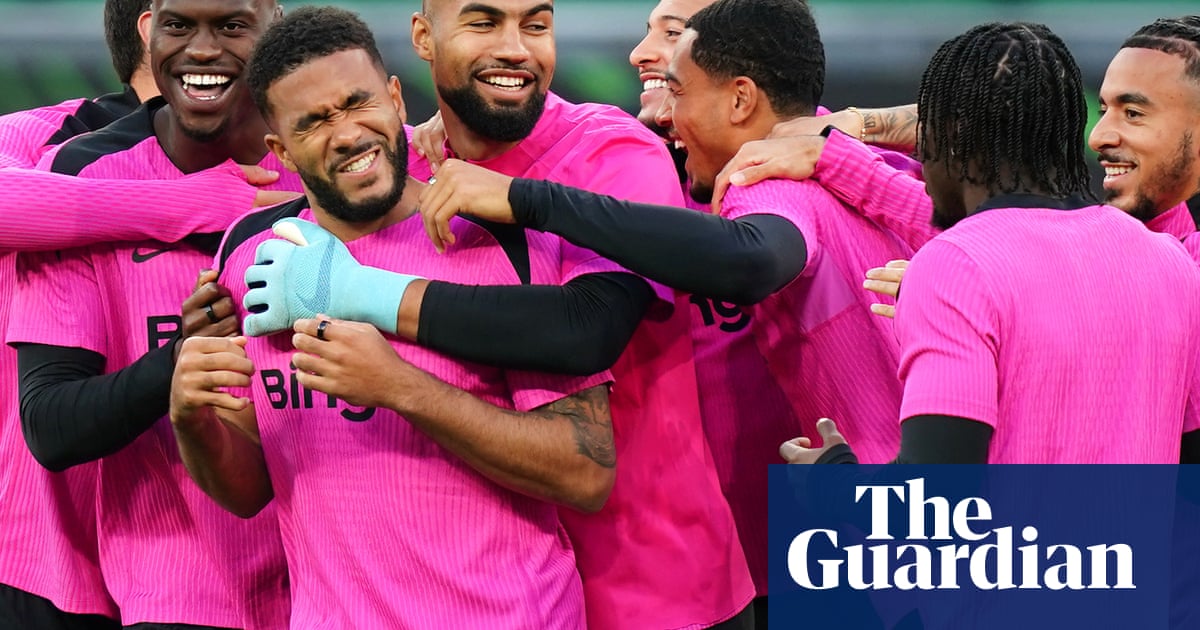Now for the bonus prize. After the joy of achieving their main goal for the season by securing a return to the Champions League withvictory against Nottingham Foreston Sunday, a triumph that led Enzo Maresca to narrow his eyes, dial down the charm and tell critics of his young side to “eff off”, there is little pressure on Chelsea’s men before they attempt to lift the first piece of silverware of the BlueCo era by beating Real Betis in the Uefa Conference League final on Wednesday night.
The stakes are low. The opponents look awkward but vulnerable. For Chelsea, the sense is that this is one to tick off before they rejoin Europe’s elite. After all, they are aware they have been a strange presence in the Conference League. This is not a place for a squad built at a cost of over £1bn. The financial reward is minimal and prestige is not on offer. Chelsea, who were champions of Europefour years ago, are hardly going to be feted if they win a tournament that Uefa invented for sides operating on much smaller budgets.
Maresca’s side have cruised since coming through aplayoff against Servettelast August. In fact, there was little chance of the Thursday‑Sunday schedule tiring Chelsea out before Christmas. They did not even bother registering Cole Palmer for the league phase. Maresca simply handed opportunities to academy players, gave minutes to his squad’s lesser lights and still saw his B‑team wallop sides from Armenia, Kazakhstan and Ireland. As for the knockouts, Chelsea probably could have put Todd Boehly up front and still beaten FC Copenhagen, Legia Warsaw and Djurgården with something to spare.
But there is nothing wrong with developing a winning habit. Chelsea’s young, maturing side saw off questions about their mentality when they won at Forest. Reaching the Champions League for the first time under the ownership of Boehly and Clearlake Capital is viewed as an important first step. The policy of signing potential on long, incentivised contracts has its first real vindication. Following it up with a trophy, even one this small, would round off an excellent four days and could act as a springboard for future success.
Look at how José Mourinho used claiming the League Cup in 2005 to turn a once inconsistent Chelsea into a winning machine. The team was relentless under Roman Abramovich. They completed the set under the Russian when they won the 21st and final trophy of his reign withvictory against Palmeirasin the Club World Cup final in February 2022, three months before Abramovich was forced to sell to Boehly and Clearlake. No wonder supporters sing: “We’ve won it all.” Now, as if the Conference League needed a way to demonstrate its relevance, comes a chance to become the first English side to have won all four European competitions; a chance for Chelsea to win it allagain.
But first, the final. The Betis squad has a certain Premier League years vibe to it: the former Liverpool goalkeeper Adrián, the former West Ham midfielder Pablo Fornals, the former Tottenham midfielder Giovani Lo Celso and the on-loan Manchester United winger Antony, who has beenin sparkling formsince heading to Spain.
This is Betis’s first European final. They have experience in Isco, a European champion with Real Madrid on five occasions. The 33-year-old oozed class during a small-sided match in training at Stadion Wroclaw on Tuesday night, scoring with an outrageous lob. Antony – get this – even used his right foot to set up a goal for the other side.
Betis believe. The key to their success is the former Manchester City and West Ham manager Manuel Pellegrini. The 71-year-old was full of positivity when he spoke to the media in Wroclaw saying the club, fresh from finishing sixth in Spain, are capable of overcoming the financial gap against Chelsea.
Maresca will not underestimate the Chilean. Chelsea’s head coach played for Pellegrini at Málaga and calls him one of his footballing fathers (the other is Monchi, Aston Villa’s director of football).
Sign up toFootball Daily
Kick off your evenings with the Guardian's take on the world of football
after newsletter promotion
The pair are close. Pellegrini advised Maresca to go into management. They spoke before the Italian took the Chelsea job last summer.
Pellegrini had Maresca as an assistant at West Ham. There is a story about Maresca masterminding West Ham’s tactics when they won at Chelsea in November 2019. His belief then shone through after Pellegrini was sacked a month later. West Ham wanted to keep Maresca; he told them he would stay if they made him manager.
Wrong time, wrong place. Maresca moved on. He had a stint at Parma, worked under Pep Guardiola at Manchester City, won the Championship with Leicester last season and found a home for his positional play at Chelsea. There is a section in his thesis on the similarities between chess and football where he talks about strategy games being an excellent way of developing the prefrontal cortex – the part of the brain responsible for anticipation, building common sense and decision-making. “All fundamental aspects in a coach,” Maresca says.
Reading Maresca’s work offers an insight into his patient tactical approach. He talks about building from the back and controlling the centre of the chessboard. He is a manager who prefers a 1-0 win. He stresses the need for a clearly defined strategy. Chess taught him not to get too excited.
But Maresca is a competitor. There are times when he will lose himself in the heat of battle and, well, celebrate victory by firing back at his critics. Football is messy. Chelsea’s grand plan never involved being in the Conference League but taking it seriously should help them make more winning moves in the future.
